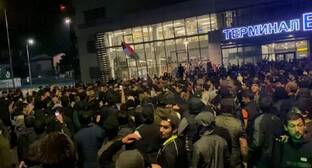14 October 2009, 21:00
Sochi residents indignant with the road that will come across their households
In Sochi, residents of the Aviatsionnaya Street were greatly surprised to learn that a new motorway built for the Winter Olympiad-2014 will run right across their houses and kitchen gardens. According to the project, supports of the overpass will be installed right in kitchen gardens, and one of them will be erected in the place of an apartment house.
As a result, the family of Galina Pridius, who live in this street for several dozens years, may find themselves homeless. The woman said that the workers who started implementing the project had been convinced that there were no houses, just waste land, in the site.
The builders agreed to suspend drilling in the area of inhabited sector, until the issue of resettling people is decided. However, since the construction goes day and night closely to this area, people complain of permanent intolerable noise and vibration, as the newspaper "Vecherni Sochi" wrote on October 12.
In this context, Anton Shafiev, deputy head of the department of property relations of the Sochi administration, said the following: "As the construction site gets improved, we'll meet the contractor. And as they start the works, we'll come and see if there's vibration there or not. Probably, it's impossible to live in such conditions. And we'll establish these facts, when the site area is already set up." However, the department said nothing about the fate of Galina Pridius and other residents of the Aviatsionnaya Street.
The situation is aggravated by the fact that the land, where people have lived for twenty-thirty years, is municipal property; therefore, the tenants are afraid of eviction.
So far, the residents of the street have decided not to let anybody to their plots for starting the works, fearing that the story of the Imereti Lowland can repeat with them; there, about 400 families were forced by the authorities to abandon their houses, having notified them that they should move out before March 31. However, by this date the house intended for resettlement were not ready. The people were offered to get accommodated at temporarily vacant sanatoria, having not specified what to do with the livestock and personal belongings.




